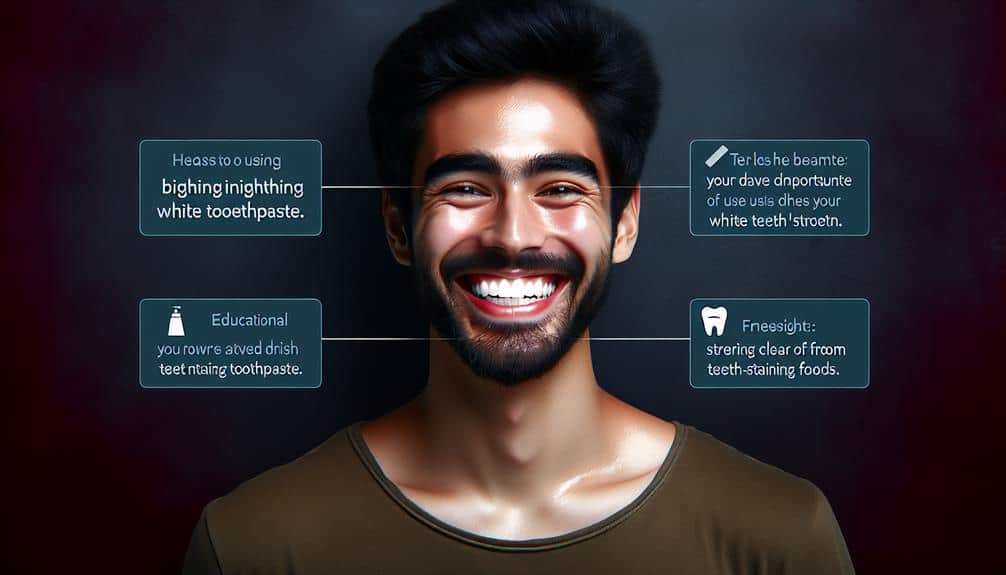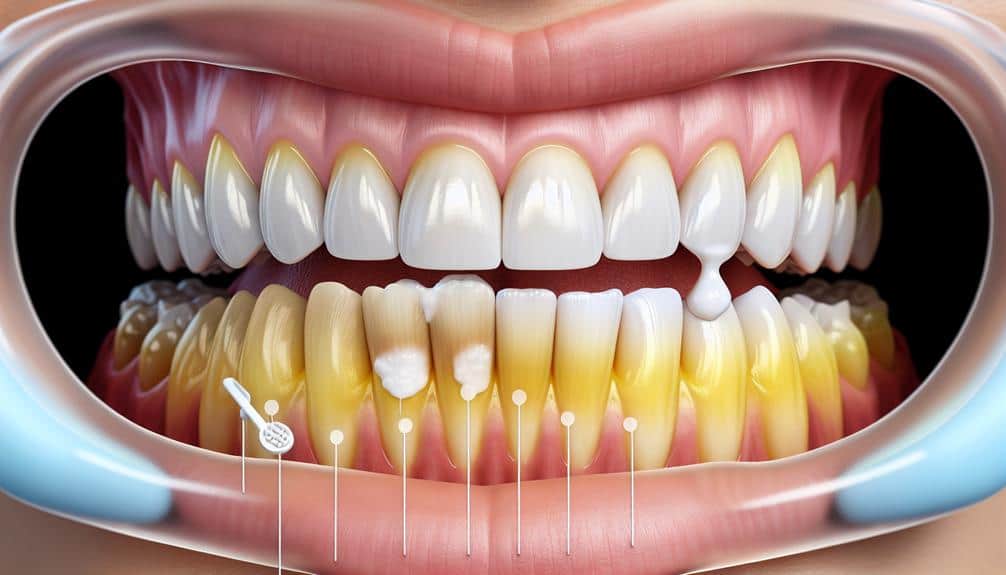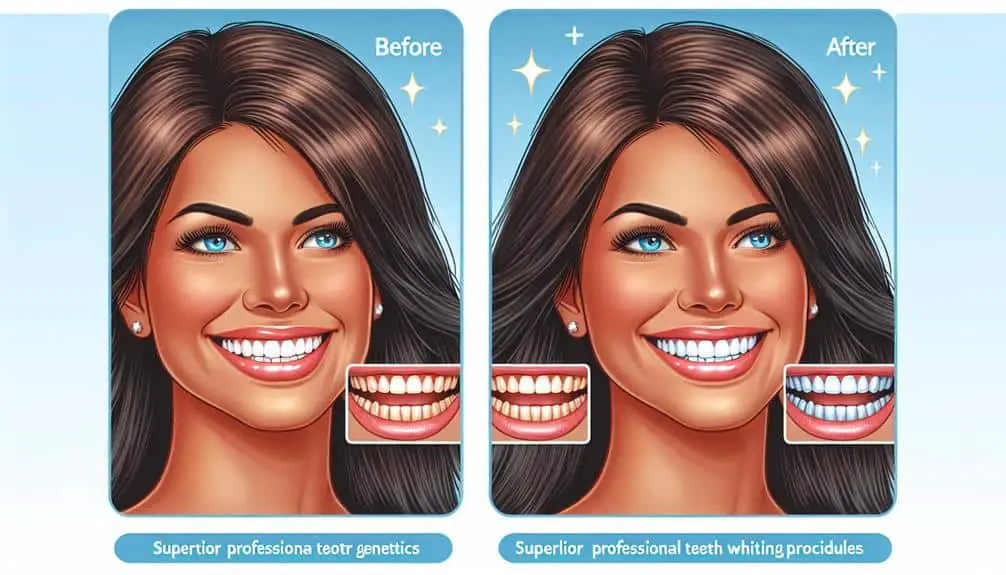To whiten genetic tooth discoloration, consider seeking professional help. In-office whitening with bleaching agents offers effective results. Laser teeth whitening can enhance the effects further. Custom whitening trays guarantee uniform application. Porcelain veneers or composite bonding can also provide long-lasting solutions. At-home whitening kits with peroxide-based gels offer convenience. Following instructions is crucial for safety. Natural remedies like oil pulling and baking soda paste can support whitening efforts. Maintain results with healthy diet choices and whitening toothpaste. Regular professional cleanings aid in preserving brightness. Achieve lasting results by incorporating these strategies into your dental care routine.
Key Points
- Consider professional whitening options like In-Office Whitening for effective results.
- Explore customized whitening solutions tailored to genetic tooth discoloration.
- Use at-home whitening kits with peroxide-based agents for gradual improvement.
- Implement natural remedies like oil pulling and baking soda paste for maintenance.
- Maintain results with oral hygiene, diet adjustments, and regular cleanings.
Understanding Genetic Tooth Discoloration
Have you ever wondered why some people have genetic tooth discoloration? Genetic tooth discoloration can be attributed to various factors, including enamel thickness and hereditary traits related to dental pigmentation. Enamel importance plays a vital role in tooth color; thinner enamel can allow the yellowish dentin underneath to show through, leading to a darker appearance.
Additionally, hereditary traits can influence the natural color of your teeth. Some individuals inherit genes that predispose them to specific dental pigmentation, resulting in darker or more yellow teeth. These genetic factors can affect the overall hue and intensity of tooth discoloration, making it resistant to traditional whitening methods.
Understanding the genetic components of tooth discoloration is essential for developing effective whitening strategies. While professional whitening options can help address surface stains, genetic tooth discoloration may require alternative approaches to achieve desired results. By recognizing the role of genetic factors, individuals can make informed decisions about their oral care and explore customized whitening solutions tailored to their specific needs.
Professional Whitening Options
Genetic tooth discoloration can present challenges for achieving desired results with traditional whitening methods, prompting the exploration of professional whitening options to effectively address stubborn stains. When exploring professional whitening options, cosmetic dentistry offers advanced solutions through various dental procedures.
Here are five key professional whitening options to contemplate:
- In-Office Whitening: Cosmetic dentists utilize professional-grade bleaching agents and specialized equipment to whiten teeth effectively in a single visit.
- Laser Teeth Whitening: This procedure involves the use of a laser to enhance the whitening effects of the bleaching agent, providing quick and noticeable results.
- Custom Whitening Trays: Dentists can create personalized trays to assure an even application of whitening gel at home, enhancing the overall whitening process.
- Porcelain Veneers: For severe discoloration cases, veneers offer a long-lasting solution by covering the front surface of teeth with custom-made porcelain shells.
- Composite Bonding: This procedure involves applying a tooth-colored resin to the teeth to mask discoloration, providing a natural-looking smile transformation.
These professional options can address genetic tooth discoloration effectively, offering tailored solutions for a brighter, more confident smile.
At-Home Whitening Kits
When considering whitening options for your teeth, exploring the effectiveness of at-home whitening kits can provide a convenient and cost-effective solution.
At-home whitening kits typically consist of whitening gel and trays that you can apply yourself over a period of time. These kits are designed to gradually whiten teeth through the use of peroxide-based bleaching agents. While at-home kits are generally safe when used as directed, following the instructions carefully is crucial to avoid potential side effects such as gum irritation or tooth sensitivity.
DIY remedies like at-home whitening kits are a popular choice due to their accessibility and affordability. However, it's important to be aware of common misconceptions surrounding these kits. One common misconception is that using more gel than recommended will speed up the whitening process. In reality, excess gel can lead to gum irritation and may not improve results. It's best to adhere to the recommended usage guidelines for best and safe whitening outcomes.
Natural Remedies and Prevention
Natural remedies and preventive measures can complement professional whitening treatments to maintain oral health and promote long-lasting whiter teeth. When it comes to tackling genetic tooth discoloration, incorporating DIY remedies and making dietary changes can greatly aid in preventing further staining.
Here are some effective strategies to enhance your oral health and keep your teeth looking bright:
- Oil Pulling: Swishing coconut or sesame oil in your mouth can help remove bacteria and promote healthier gums.
- Baking Soda Paste: Mixing baking soda with water to create a paste and brushing with it gently can help remove surface stains.
- Apple Cider Vinegar Rinse: Diluting apple cider vinegar with water and using it as a mouthwash may help whiten teeth due to its acidic properties.
- Eating Crunchy Fruits and Vegetables: Foods like apples, carrots, and celery can help scrub away plaque and stains naturally.
- Limiting Staining Foods: Reducing consumption of coffee, tea, and red wine can prevent further discoloration of your teeth.
Maintenance Tips for Lasting Results
To maintain the lasting outcomes of professional whitening treatments and natural remedies, consistent oral hygiene practices are essential. After investing in whitening solutions, such as in-office treatments or natural remedies, incorporating diet adjustments can help preserve the effects. Limiting foods and drinks known to stain teeth, like coffee, tea, and red wine, can prevent discoloration from reoccurring.
Additionally, maintaining excellent oral hygiene is vital. Brush your teeth at least twice a day with a fluoride toothpaste and floss daily to remove plaque and prevent new stains from forming. Consider using a whitening toothpaste to help maintain the results achieved through treatment. Visiting your dentist regularly for professional cleanings can also aid in preserving your brighter smile.
Incorporating these maintenance tips into your daily routine can significantly prolong the results of your whitening efforts. By being mindful of your diet, practicing proper oral hygiene, and seeking professional dental care, you can enjoy a brighter, whiter smile for an extended period.
Frequently Asked Questions
Can Genetic Tooth Discoloration Be Completely Reversed With Whitening Treatments?
You cannot completely reverse genetic tooth discoloration with whitening treatments. While whitening can improve the appearance, genetic factors may limit effectiveness. Long term results may vary, as genetic tooth discoloration may persist despite treatment efforts.
Are There Any Specific Foods or Substances That Should Be Avoided to Prevent Worsening Genetic Tooth Discoloration?
To prevent worsening genetic tooth discoloration, consider preventive measures like avoiding foods high in pigments or acids. Dietary restrictions can help maintain tooth color. Consistent care and attention to what you consume are key.
How Can Genetic Tooth Discoloration Impact Overall Dental Health, Beyond Just Aesthetics?
Genetic tooth discoloration can impact health by indicating underlying dental issues like weak enamel or decay. Preventive measures include regular dental check-ups, good oral hygiene, and avoiding tobacco. Prioritize dental health beyond aesthetics.
Are There Any Specific Dental Procedures or Treatments That Can Help Improve Genetic Tooth Discoloration in Addition to Whitening Options?
To improve genetic tooth discoloration, consider dental bonding or veneers for lasting results. Laser therapy or enameloplasty can also be effective. Discuss these options with your dentist for personalized recommendations based on your unique situation.
Are There Any Advancements in Dental Technology or Research That May Offer New Solutions for Genetic Tooth Discoloration in the Future?
In the future, dental advancements and ongoing research show promise for new solutions to genetic tooth discoloration. Keep an eye on emerging technologies and treatments that may offer hope for brighter smiles ahead.



